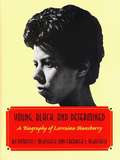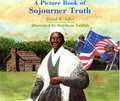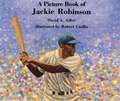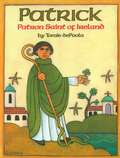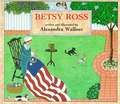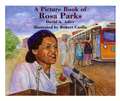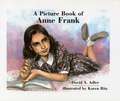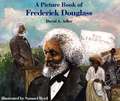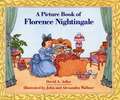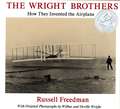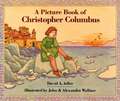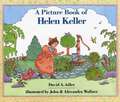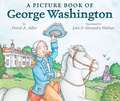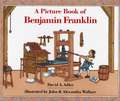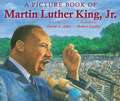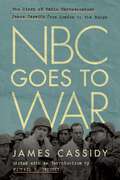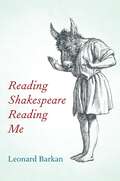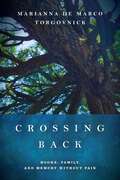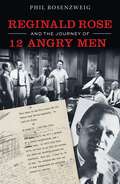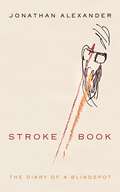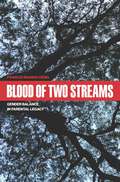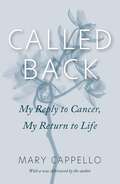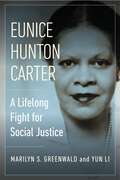- Table View
- List View
Young, Black and Determined: A Biography of Lorraine Hansberry
by Patricia C. Mckissack Fredrick L. MckissackHere is the remarkable story of the first African-American woman to open a play, A Raisin in the Sun, on Broadway.
A Picture Book of Sojourner Truth
by David A. AdlerFrom the Book Jacket: Sojourner Truth was born into slavery in 1797 in Hurley, New York. Her parents named her Isabella, but she renamed herself Sojourner Truth years later, when she was free. Isabella worked for many different masters before joining a religious community called the "Kingdom of God." After being falsely accused of poisoning the group's leader, she decided to leave New York and "sojourn"-visit different places-and preach. She spoke out on religious issues, the evils of slavery, and the rights of women. During the Civil War, Sojourner raised money to help feed African-American soldiers and cared for slaves who had escaped north to freedom. She died in 1883 and is remembered for her bold, outspoken role in the struggle for freedom for all people. David A. Adler's Picture Book Biographies have been hailed as an "expert mixture of facts and personality" (School Library Journal) and "handsomely designed" (Booklist). Mr. Adler lives in New York with his wife and three sons. Gershom Griffith has illustrated one other picture book, Jumping the Broom by Courtni C. Wright. He divides his time between New York City and Marietta, Georgia.
Tales of St. Patrick
by Eileen DunlopFrom the dust jacket: "Not much is known for certain about Patrick, the celebrated patron saint of Ireland. Using Patrick's own writings and other ancient sources, while acknowledging that many of the best-known stories about him are clearly legends, Eileen Dunlop has written about what Patrick's life might have been like. Beginning with his privileged childhood in fifth century Britain, and continuing on through his abduction into slavery in Ireland and his religious awakening, Dunlop paints a portrait of a man who deeply loved God and the Irish people. After many setbacks and years of religious study, Patrick became Bishop of Ireland. He traveled throughout the country and taught Christianity to a largely pagan population. One of the many legends about St. Patrick proclaims that on the night he died, no darkness fell."
A Picture Book of Jackie Robinson
by David A. AdlerThe first African American to play in the major leagues.
Keep on Singing: A Ballad of Marian Anderson
by Myra Cohn Livingston"When she sang Deep River, One teacher wondered why A tall, calm girl at twilight Should make him want to cry." (The teacher was Arturo Toscanini.) Other books by this American poet are available in this library.
Patrick: Patron Saint of Ireland
by Tomie DepaolaFrom his noble birth in Britain to his being captured and taken to Ireland by a group of bandits to the "dreams" that led him to convert the Irish people to the Christian faith, the story of Patrick is told. Four of the miracles he is believed to have performed are also described.
Betsy Ross
by Alexandra WallnerAn introduction to the life of the Philadelphia seamstress credited with sewing the first American flag
A Picture Book of Rosa Parks
by David A. AdlerA biography of the Alabama black woman whose refusal to give up her seat on a bus helped establish the civil rights movement.
A Picture Book of Anne Frank
by David A. AdlerTraces the life of the young Jewish girl whose diary chronicles the years she and her family hid from the Nazis in an Amsterdam attic.
A Picture Book of Frederick Douglass
by David A. AdlerA biography of the man who, after escaping slavery, became an orator, writer, and leader in the abolitionist movement in the nineteenth century.
A Picture Book of Florence Nightingale
by David A. AdlerFlorence Nightingale was the daughter of a rich family from England, but she felt that her life could be so much more. She decided to become a nurse and because of her we have clean hospitals and good nursing care. This biography for younger readers tells the life of Florence and her incredible work in the United Kingdom for better hospital care.
The Wright Brothers: How They Invented The Airplane
by Russell FreedmanHe saw the first regular airmail service introduced in 1918, the first nonstop transcontinental flight in 1923, the first round-the-world flight in 1924, the first polar flight in 1926, and the first nonstop flight across the Atlantic in 1927. He witnessed two world wars in which the airplane played a critical role. He saw the earth shrink as the jet engine replaced propellers. He lived to see airplanes that flew faster than the speed of sound, and planes whose wings stretched farther than the distance of his first flight at Kitty Hawk. There were moments when he looked back wistfully to those long-ago days when flying was still a dream that he shared with his brother. He once said, “I got more thrill out of flying before I had ever been in the air at all – while lying in bed thinking how exciting it would be to fly.”<P><P> Newbery Medal Honor book
A Picture Book of Christopher Columbus (Picture Biography Series)
by David A. AdlerFrom the Book jacket: Born in Genoa, Italy, in 1451, Christopher Columbus dreamed of going to sea. He knew the earth was round, and planned a voyage west into the unknown waters of the Atlantic to reach the Indies. But it wasn't until he was 41 years old that Queen Isabella and King Ferdinand of Spain gave him the funds, the three boats, and the men to make a voyage. Even though Columbus never reached the Indies, he made a more important discovery. On October 12, 1492, he landed on an island southeast of Florida. Since he thought he had reached the Indies, he named the natives Indians. Columbus made three more voyages and is credited with discovering the New World.
A Picture Book of Helen Keller
by David A. AdlerA brief biography of the woman who overcame her handicaps of being both blind and deaf.
A Picture Book of George Washington
by David A. AdlerA simple presentation of George Washington's character and the major events of his life.
A Picture Book of Benjamin Franklin
by David A. AdlerSurveys the life of Benjamin Franklin, highlighting his work as an inventor and statesman.
A Picture Book of Martin Luther King, Jr
by David A. AdlerA brief biography of the Baptist minister and civil rights leader whose philosophy and practice of nonviolent civil disobedience helped American blacks win many battles for equal rights.
NBC Goes to War: The Diary of Radio Correspondent James Cassidy from London to the Bulge (World War II: The Global, Human, and Ethical Dimension)
by James CassidyThe diary of radio correspondent James Cassidy presents a unique view of World War II as this reporter followed the Allied armies into Nazi Germany.James Joseph Cassidy was one of 362 American journalists accredited to cover the European Theater of Operations between June 7, 1944, and the war’s end. Radio was relatively new, and World War II was its first war. Among the difficulties facing historians examining radio reporters during that period is that many potential primary documents—their live broadcasts—were not recorded. In NBC Goes to War, Cassidy’s censored scripts alongside his personal diary capture a front-line view during some of the nastiest fighting in World War II as told by a seasoned NBC reporter.James Cassidy was ambitious and young, and his coverage of World War II for the NBC radio network notched some notable firsts, including being the first to broadcast live from German soil and arranging the broadcast of a live Jewish religious service from inside Nazi Germany while incoming mortar and artillery shells fell 200 yards away. His diary describes how he gathered news, how it was censored, and how it was sent from the battle zone to the United States. As radio had no pictures, reporters quickly developed a descriptive visual style to augment dry facts. All of Cassidy’s stories, from the panic he felt while being targeted by German planes to his shock at the deaths of colleagues, he told with grace and a reporter’s lean and engaging prose.Providing valuable eyewitness material not previously available to historians, NBC Goes to War tells a “bottom-up” narrative that provides insight into war as fought and chronicled by ordinary men and women. Cassidy skillfully placed listeners alongside him in the ruins of Aachen, on icy back roads crawling with spies, and in a Belgian bar where a little girl wailed “Les Américains partent!” when Allied troops retreated to safety, leaving the town open to German re-occupation. With a journalistic eye for detail, NBC Goes to War unforgettably portrays life in the press corps. This newly uncovered perspective also helps balance the CBS-heavy radio scholarship about the war, which has always focused heavily on Edward R. Murrow and his “Murrow’s Boys.”
Reading Shakespeare Reading Me
by Leonard BarkanA gripping, funny, joyful account of how the books you read shape your own life in surprising and profound ways.Bookworms know what scholars of literature are trained to forget: that when they devour a work of literary fiction, whatever else they may be doing, they are reading about themselves. Read Shakespeare, and you become Cleopatra, Hamlet, or Bottom. Or at the very least, you experience the plays as if you are in a small room alone with them, and they are speaking to your life, your sensibility.Drawing on fifty years as a Shakespearean, Leonard Barkan has produced a captivating book that asks us to reconsider what it means to read. Barkan violates the rule of distance he was taught and has always taught his students. He asks: Where does this brilliantly contrived fiction actually touch me? Where is Shakespeare in effect telling the story of my life?King Lear, for Barkan, raises unanswerable questions about what exactly a father does after planting the seed. Mothers from Gertrude to Lady Macbeth are reconsidered in the light of the author’s experience as a son of a former flapper. The sonnets and comedies are seen through the eyes of a gay man who nevertheless weeps with joy when all the heterosexual couples are united at the end. A Midsummer Night’s Dream is interpreted through the author’s joyous experience of performing the role of Bottom and finding his aesthetic faith in the pantheon of antiquity. And the exquisitely poetical history play Richard II intersects with, of all things, Ru Paul’s Drag Race.Full of engrossing stories, from family secrets to the world of the theater, and written with humor and genuine excitement about literary experiences worthy of our attention and our love, Reading Shakespeare Reading Me makes Shakespeare’s plays come alive in new ways.
Crossing Back: Books, Family, and Memory without Pain
by Marianna De Marco TorgovnickFrom the award-winning author of Crossing Ocean Parkway, a personal memoir about adjusting to loss through books, meditation, and the process of memory itselfMarianna De Marco Torgovnick experienced the rupture of two of her life’s most intimate relations when her mother and brother died in close proximity. Mourning rocked her life, but it also led to the solace and insight offered by classic books and the practice of meditation. Her resulting journey into the past imagines a viable future and raises questions acute for Italian Americans but pertinent to everyone, about the nature of memory and the meanings of home at a time, like ours, marked by cultural disruption and wartime. Crossing Back: Books, Family, and Memory without Pain presents a personal perspective on death, mourning, loss, and renewal.A sequel to her award-winning and much-anthologized Crossing Ocean Parkway, Crossing Back is about close familial ties and personal loss, written after the death of her remaining birth family, who had always been there, and now were not. After their loss, she entered a spiritual and psychological state of “transcendental homelessness”: the feeling of being truly at home nowhere, of being spiritually adrift. In a grand act of symbolic reenactment, she found herself moving apartments repeatedly, not realizing she did so subconsciously to keep busy, to stave off grief. By reading and studying great books, she opened up to mourning, a process she constitutionally resisted as somehow shameful. Over time, she discovered that a third death colored and prolonged her feelings of grief: her first child’s death in infancy, which, in the course of a happier lifetime, had never been adequately acknowledged. Her new losses led her finally to take stock of her son’s death too. Reading and meditating, followed by writing, became daily her healing rituals.A warm and intimate user’s guide to books, family, and memory in the mourning process, the end-point being memory without pain, Crossing Back is a wide-ranging memoir about growing older and learning to ride the waves of change. Lively and conversational, Torgovnick is masterful at tracking the moment-to moment, day-to-day challenges of sudden or protracted grief and the ways in which the mind and the body seem to search for—and sometimes find—solutions.
Reginald Rose and the Journey of 12 Angry Men
by Phil RosenzweigFinalist, 2021 Wall Award (Formerly the Theatre Library Association Award)The untold story behind one of America’s greatest dramasIn early 1957, a low-budget black-and-white movie opened across the United States. Consisting of little more than a dozen men arguing in a dingy room, it was a failure at the box office and soon faded from view.Today, 12 Angry Men is acclaimed as a movie classic, revered by the critics, beloved by the public, and widely performed as a stage play, touching audiences around the world. It is also a favorite of the legal profession for its portrayal of ordinary citizens reaching a just verdict and widely taught for its depiction of group dynamics and human relations. Few twentieth-century American dramatic works have had the acclaim and impact of 12 Angry Men.Reginald Rose and the Journey of “12 Angry Men” tells two stories: the life of a great writer and the journey of his most famous work, one that ultimately outshined its author. More than any writer in the Golden Age of Television, Reginald Rose took up vital social issues of the day—from racial prejudice to juvenile delinquency to civil liberties—and made them accessible to a wide audience. His 1960s series, The Defenders, was the finest drama of its age and set the standard for legal dramas. This book brings Reginald Rose’s long and successful career, its origins and accomplishments, into view at long last.By placing 12 Angry Men in its historical and social context—the rise of television, the blacklist, and the struggle for civil rights—author Phil Rosenzweig traces the story of this brilliant courtroom drama, beginning with the chance experience that inspired Rose, to its performance on CBS’s Westinghouse Studio One in 1954, to the feature film with Henry Fonda. The book describes Sidney Lumet’s casting, the sudden death of one actor, and the contribution of cinematographer Boris Kaufman. It explores the various drafts of the drama, with characters modified and scenes added and deleted, with Rose settling on the shattering climax only days before filming began.Drawing on extensive research and brimming with insight, this book casts new light on one of America’s great dramas—and about its author, a man of immense talent and courage.Author royalties will be donated equally to the Feerick Center for Social Justice at Fordham Law School and the Justice John Paul Stevens Jury Center at Chicago-Kent College of Law.
Stroke Book: The Diary of a Blindspot
by Jonathan AlexanderAn archive of personal trauma that addresses how a culture still toxic to queer people can reshape a bodyIn the summer of 2019, Jonathan Alexander had a minor stroke, what his doctors called an “eye stroke.” A small bit of cholesterol came loose from a vein in his neck and instead of shooting into his brain and causing damage, it lodged itself in a branch artery of his retina, resulting in a permanent blindspot in his right eye. In Stroke Book, Alexander recounts both the immediate aftermath of his health crisis, which marked deeper health concerns, as well as his experiences as a queer person subject to medical intervention.A pressure that the queer ill contend with is feeling at fault for their condition, of having somehow chosen illness as punishment for their queerness, however subconsciously. Queer people often experience psychic and somatic pressures that not only decrease their overall quality of life but can also lead to shorter lifespans. Emerging out of a medical emergency and a need to think and feel that crisis through the author’s sexuality, changing sense of dis/ability, and experience of time, Stroke Book invites readers on a personal journey of facing a health crisis while trying to understand how one’s sexual identity affects and is affected by that crisis. Pieceing and stitching together his experience in a queered diary form, Alexander’s lyrical prose documents his ongoing, unfolding experience in the aftermath of the stroke. Through the fracturing of his text, which almost mirrors his fractured sight post-stroke, the author grapples with his shifted experience of time, weaving in and out, while he tracks the aftermath of what he comes to call his “incident” and meditates on how a history of homophobic encounters can manifest in embodied forms.The book situates itself within a larger queer tradition of writing—first, about the body, then about the body unbecoming, and then, yet further, about the body ongoing, even in the shadow of death. Stroke Book also documents the complexities of critique and imagination while holding open a space for dreaming, pleasure, intimacy, and the unexpected.
Blood of Two Streams: Gender Balance in Parental Legacy
by Francis Mading DengThis book—part memoir, part political statement—examines the influence of the author’s maternal and paternal ancestry on his life. Delving into the rich history of Francis Mading Deng’s heritage, Blood of Two Streams acts as a bridge to cross-cultural understanding and multidisciplinary connection between the personal, the communal, and the universal.
Called Back: My Reply to Cancer, My Return to Life
by Mary CappelloForeword Book of the Year Award Independent Publishers Award (IPPY) Lambda Literary Award Finalist Publishing Triangle Award Finalist GAMMA Award, Best Feature from The Magazine Association of the Southwest for “Getting the News,” The Georgia Review, Summer 2009 Notable Essay of the Year Citation in Best American Essays 2010 for “Getting the News” Named one of the Best Books of the Year by the Guerilla Girls On Tour and by WILLA: Women in Literary Arts and LettersAn extended meditation on the nature of love and the nature of time inside illness, Called Back is both a narrative and non-narrative experiment in prose. The book moves through the standard breast cancer treatment trajectory (diagnosis, surgery, chemotherapy, radiation), with the aim of discovering unexpected vectors of observation, meaning and desire inside each phase of the typically mandated four-part ritual. A lyrical feminist critique of living with cancer at the turn of the twenty-first century in the United States, the book looks through the lens of cancer to discover new truths about intimacy and essential solitude, eroticism, the fact of the body, and the impossibility of turning away. Offering original exegeses of the work of Marsden Hartley, Emily Dickinson, Gertrude Stein, and Marcel Proust, Called Back relies on these artists’ queer aesthetics to tease the author back to life. What might a person tutored as a reader of signs “see” inside breast cancer’s paces, protocols, and regimes? What does the experience occlude, and what can we afford to liberate? The first chapter paves the way for the book’s central emphases: a meditation on the nature of “news” and the new, on noticing, on messages—including those that the body itself relies upon in the assumption of disease—and the interpretive methods we bring to them in medical crisis. Language is paramount for how we understand and act on the disease, how we imagine it, how we experience it, and how we treat it, Cappello argues. Working at the borders of memoir, literary nonfiction, and cultural analysis, Called Back aims to displace tonal and affective norms— infantilizing or moralizing, redemptive, sentimental or cute—with reverie, rage, passionate intensity, intelligence, and humor.
Eunice Hunton Carter: A Lifelong Fight for Social Justice
by Yun Li Marilyn Greenwald2022 PROSE Awards Category Winner - Biography & AutobiographyForeword INDIES Book of the Year Awards - 2021 BRONZE Winner for BiographyThe fascinating biography of Eunice Hunton Carter, a social justice and civil rights trailblazer and the only woman prosecutor on the Luciano trial Eunice Hunton Carter rose to public prominence in 1936 as both the only woman and the only person of color on Thomas Dewey’s famous gangbuster team that prosecuted mobster Lucky Luciano. But her life before and after the trial remains relatively unknown. In this definitive biography on this trailblazing social justice activist, authors Marilyn S. Greenwald and Yun Li tell the story of this unknown but critical pioneer in the struggle for racial and gender equality in the twentieth century.Carter worked harder than most men because of her race and gender, and Greenwald and Li reflect on her lifelong commitment to her adopted home of Harlem, where she was viewed as a role model, arts patron, community organizer, and, later, as a legal advisor to the United Nations, the National Council of Negro Women, and several other national and global organizations.Carter was both a witness to and a participant in many pivotal events of the early and mid– twentieth century, including the Harlem riot of 1935 and the social scene during the Harlem Renaissance.Using transcripts, letters, and other primary and secondary sources from several archives in the United States and Canada, the authors paint a colorful portrait of how Eunice continued the legacy of the Carter family, which valued education, perseverance, and hard work: a grandfather who was a slave who bought his freedom and became a successful businessman in a small colony of former slaves in Ontario, Canada; a father who nearly single-handedly integrated the nation’s YMCAs in the Jim Crow South; and a mother who provided aid to Black soldiers in France during World War I and who became a leader in several global and domestic racial equality causes.Carter’s inspirational multi-decade career working in an environment of bias, segregation, and patriarchy in Depression-era America helped pave the way for those who came after her.
